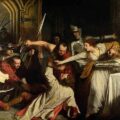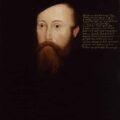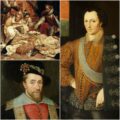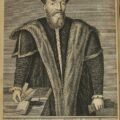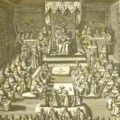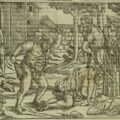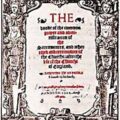On this day in Elizabeth I’s reign, 26th March 1566, Matthew Parker, Archbishop of Canterbury, and Edmund Grindal, Bishop of London, summoned 110 ministers to Lambeth Palace to get them to pledge their willingness to wear vestments. 37 of those ministers refused. This led to trouble – a pamphlet war between Parker and the non-conformist, ministers losing their livings, and protests.
You can found out more about it in this video, or in the transcript of that section below:
On 26th March 1566, also in the reign of Queen Elizabeth I, Matthew Parker, Archbishop of Canterbury, and Edmund Grindal, Bishop of London, summoned one hundred and ten ministers to Lambeth Palace to get them to pledge their willingness to wear vestments, as worn by the man in front of them: Robert Cole, a former non-conformist who now complied.
The outfit consisted of a square cap, gown, tippet, and surplice. They were also asked “to inviolably observe the rubric of the Book of Common Prayer, and the queen’s majesty’s injunctions, and the Book of Convocation” and to commit to these orders on the spot, by writing “volo” or “no volo”.
Thirty-seven ministers refused and were suspended. This sparked off a pamphlet war between Parker and non-conformists like Robert Crowley, Vicar of St Giles-without-Cripplegate, who published “A Briefe Discourse Against the Outwarde Apparel of the Popishe Church”. Crowley saw vestments as evil, quoting Psalm 31: “I have hated all those that holde of superstitious vanities”, on the title page, and viewing their uses as encouraging Papists.
In response, Parker in his work “ A Brief Examination for the Tyme of a Certaine Declaration Lately Put in Print in the name and defence of certaine ministers in London, refusyng to weare the apparell prescribed by the lawes and orders of the Realme”, accused Crowley of challenging royal supremacy and of leading the laity astray by disobeying the laws of the land. There were further battles, with non-conformists seeing vestments as an abuse but others like Parker seeing their use as important and part of the Church’s duty.
Crowley ended up being deprived of his parish in June 1566, along with other non-conformists.
There wasn’t just a pamphlet war between these churchmen, there were also protests of women in London in support of the non-conformists, and women like Anne Locke, a good friend of reformer John Knox, and Catherine Bertie, Duchess of Suffolk, supported them and acted as patron to these non-conformist ministers.
Vestments weren’t the only issue for these non-conformists, the root of their unhappiness was the failure of their petition to have the 1559 Book of Common Prayer revised. They were unhappy with Archbishop Parker prescribing that the book should be conformed to in every aspect.
